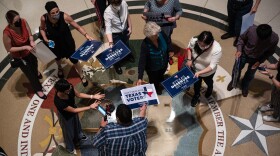-
A legal challenge to North Carolina’s same-day voter laws entered its third day Wednesday in Winston-Salem, and North Carolina voter integrity groups were front and center.
-
The House has passed legislation that would make sweeping changes to voter registration, including requiring those signing up to present documents proving U.S. citizenship.
-
Republican-backed elections bills aim to curb voter access, say Democrats and civil rights groups.
-
The U.S. Department of Justice claims the Texas law contains several provisions that "will disenfranchise eligible Texas citizens who seek to exercise their right to vote."
-
North Carolina's highest court has ruled that felony offenders who are out of prison and registered to vote in North Carolina during a roughly 10-day period thanks to a recent order by trial judges will remain on voting rolls for now. The state Supreme Court declined on Friday to reinstate an order last month that declared any offender no longer behind bars could register.
-
A North Carolina appeals court has blocked an order that had allowed well over 50,000 felony offenders who aren’t serving prison or jail time to immediately register to vote and cast ballots. The state Court of Appeals agreed on Friday to halt last week’s decision by trial judges to expand when North Carolina residents convicted of felonies have the right to vote again.
-
The legislation now heads to Gov. Greg Abbott, who plans to sign it. Once he does, Texas will become the latest GOP-run state to enact new voting restrictions.
-
Plaintiffs for people out of prison but prevented from voting have urged the court to correct the law viewed as discriminatory. The state doesn't deny racial disparity but objects to a proposed solution.
-
The ruling this week essentially gutted what's left of the Voting Rights Act, but there's a lot of action — and inaction — happening elsewhere on the topic. Here's what to watch for next.
-
A GOP-backed elections bill would eliminate a three-day grace period for counting properly postmarked mail-in ballots.
Play Live Radio
Next Up:
0:00
0:00
Available On Air Stations










